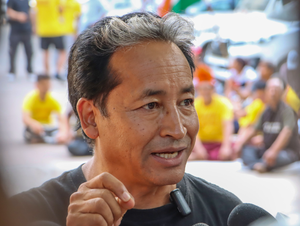On Monday, the Supreme Court of India will review a plea filed by Gitanjali J. Angmo, the wife of well‑known Ladakh climate activist Sonam Wangchuk. The petition challenges the government’s decision to hold Wangchuk in custody.
The court’s schedule, posted on its website, shows a bench of Justices Aravind Kumar and N.V. Anjaria will hear the case on October 6. In a tweet that week, Angmo said she had asked for a Habeas Corpus petition after a week of uncertainty. “I still don’t know anything about my husband’s health, his condition, or why he is detained,” she added.
Wangchuk was arrested after a series of clashes in Leh in late September. He had begun a hunger strike on September 10 but ended it the day violence flared. He broke his fast, fled in an ambulance, and was then taken into custody under the National Safety Act. He is now jailed in Jodhpur, Rajasthan.
The protests in Leh, which were part of a larger call for Ladakh’s statehood and inclusion in India’s 6th Schedule, turned violent. Protesters hurled stones and torched a CRPF vehicle that allegedly threatened to burn soldiers inside. Police say security forces fired to defend themselves. The gunfire killed four civilians: Jigmet Dorjey, Rinchen Dadul, Stanzin Namgail, and Tsewang Tharchin. The government maintains the shooting was in self‑defence amid a chaotic riot that also burned a BJP office and the LAB office.
Local groups, including the Leh Apex Body and the Kargil Democratic Alliance, want the unconditional release of Wangchuk and others detained since September 24. They also demand an investigation into the deaths caused by the firing.
Wangchuk is a respected figure in Ladakh. He has championed education reforms, built low‑cost schools that serve thousands of children, and promoted environmental conservation and scientific innovation. He has earned national and international praise for his work in climate activism and sustainable development.
The Supreme Court’s hearing will decide whether Wangchuk’s detention is lawful and whether his case should be referred back to the lower courts. The outcome could shape the future of protest movements and environmental advocacy in the Union Territory.
Stay informed on all the latest news, real-time breaking news updates, and follow all the important headlines in world News on Latest NewsX. Follow us on social media Facebook, Twitter(X), Gettr and subscribe our Youtube Channel.



